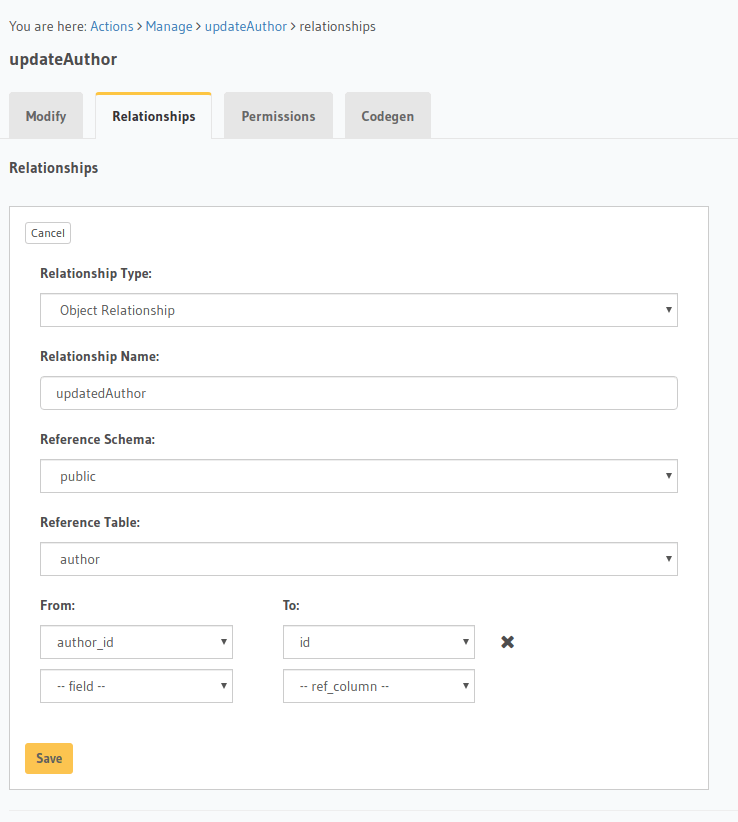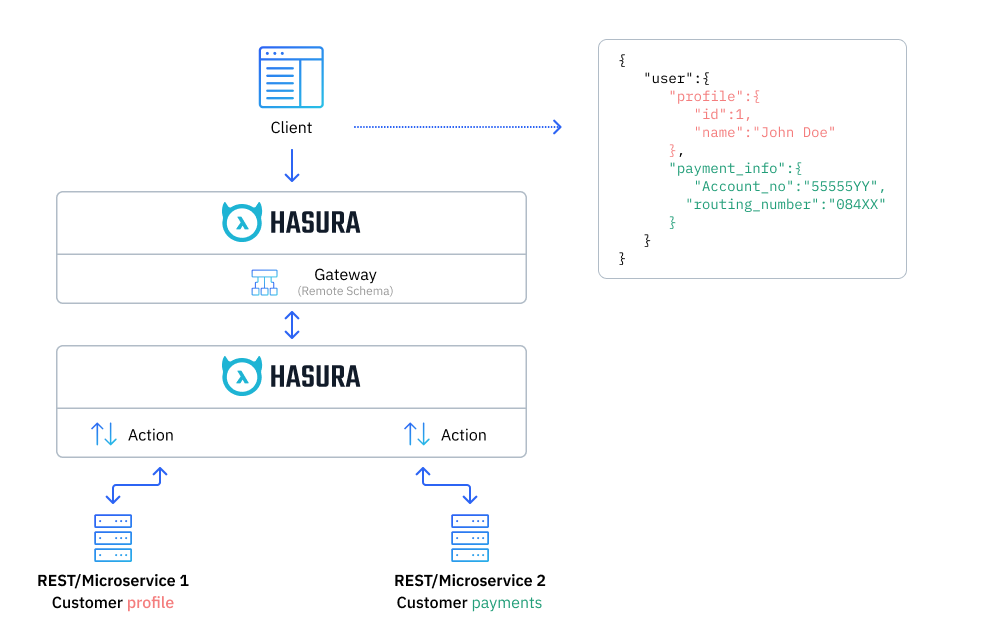Action Relationships
Introduction
Actions are a way to extend your GraphQL schema with custom queries or mutations which call a REST endpoint. It is a typical case that an Action's response is actually related to existing objects in the schema and as such, should be connected with the rest of the graph.
For example, a custom insertAuthor action will be related to the author object in the schema. Hence, we would want
to be able to get information about the author from the graph as a response of the insertAuthor mutation.
Support for Action relationships
Below, you can find information about the different types of relationship patterns that are supported for Actions.
| Relationship Type | Description |
|---|---|
| Action to Database | Joins are supported from Actions to tables in Postgres databases. However, Action to database joins are not currently supported for other databases. |
| Action to Action | Actions can be joined to each other by using a Hasura instance as a federation gateway, or "parent" supergraph. You can find more information about this pattern here. |
| Action to Remote Schema | An Action cannot be joined to a Remote Schema. |
Using an Action's output types in relationships
Actions can be connected to the rest of the graph by setting up relationships on its return output type.
This allows complex responses to be returned as an Action's response by traversing the graph via the output type's relationships.
For example, given the action:
type Mutation {
updateAuthor(id: Int!, name: String!): UpdateAuthorOutput
}
type UpdateAuthorOutput {
author_id: Int!
}
We can create an object relationship called updatedAuthor between the UpdateAuthorOutput object type and the
author table using the UpdateAuthorOutput.author_id and author.id fields.
The object type will now be modified as:
type UpdateAuthorOutput {
author_id: Int!
updatedAuthor: author
}
Now we can make a mutation request with a complex response such as:
mutation updateAuthorAndGetArticles($id: Int, $name: String) {
updateAuthor(id: $id, name: $name) {
author_id
updatedAuthor {
id
name
articles {
id
title
}
}
}
}
See more details at custom object type relationships
Creating relationships for custom object types
You can create relationships for custom output types by:
- Console
- CLI
- API
Head to the Actions -> [action-name] -> Relationships tab in the Console for the Action returning the output type.
Set the output type relationship as shown below:

Hit Save to create the relationship.
Go to metadata/actions.yaml in the Hasura Project directory.
Update the definition of the UpdateAuthorOutput object type as:
- custom_types
- objects
- name: UpdateAuthorOutput
relationships:
- name: updatedAuthor
type: object
remote_table:
schema: public
name: author
field_mapping:
author_id: id
Save the changes and run hasura metadata apply to create the relationship.
Action relationships can be added while defining custom types via the set_custom_types Metadata API:
POST /v1/metadata HTTP/1.1
Content-Type: application/json
X-Hasura-Role: admin
{
"type": "set_custom_types",
"args": {
"scalars": [],
"enums": [],
"input_objects": [],
"objects": [
{
"name": "UpdateAuthorOutput",
"fields": [
{
"name": "author_id",
"type": "Int!"
}
],
"relationships": [
{
"name": "updatedAuthor",
"type": "object",
"remote_table": "author",
"field_mapping": {
"author_id": "id"
}
}
]
}
]
}
}
Action to Action relationships
Hasura supports creating relationships between data originating from different REST APIs which have been added as Actions by using a Hasura instance as a federation gateway, or "parent" supergraph.

To achieve this we can add a "child" Hasura instance to a "parent" or "gateway" Hasura instance as a Remote Schema. This allows relationships to be created between types from two different Actions in the child instance by creating a Remote Schema to Remote Schema relationship on the same Remote Schema.
Currently, this method of adding a child instance as a Remote Schema to achieve Action to Action relationships is a viable and effective workaround. In the future we will be adding a more native method of creating Action to Action relationships without utilizing Remote Schemas.
Introduction to Hasura Actions - View Recording.